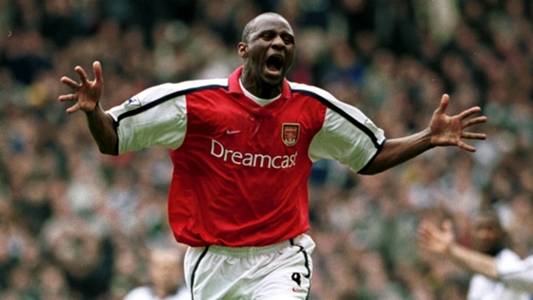There is always great debate around all time Premier League elevens. But Patrick Vieira tends to feature in most selections. A naturally gifted footballer who achieved pretty much everything there is to achieve in the game, he also came to symbolise the mid-1990s transformation of Arsenal and, to some extent, the Premier League.
Vieira’s debut for Arsenal has become one of those ‘I was there’ moments and rarely can a player have had such an immediate impact on a team and its supporters. Arsenal fans might point to Ian Wright’s stunning impact when joining from Crystal Palace in September 1991, but Wright had already made a significant impact in English football, most notably with his brace of goals in the 1990 FA Cup final against Manchester United. Thierry Henry’s impact on Arsenal was possibly even more seismic, but Henry took a while to get going, with his first Arsenal goal not coming until his ninth appearance.
Vieira, however, was a complete unknown, possibly only usurped in anonymity by the soon to arrive Arsene Wenger. Arsenal lined up to face Sheffield Wednesday on the 16 September 1996 under the stewardship of Stewart Houston and Pat Rice (Bruce Rioch having left the club after one season). To tabloid amusement (Arsene who?) and general bewilderment among fans, Arsenal’s Vice-Chairman David Dein had lined Wenger up to take on one of England’s top football jobs, but first there was a bizarre waiting period while Wenger fulfilled his commitments in Japan.
Talking of bizzare, before the match Wenger appeared with a message for Arsenal fans on the Jumbotron (big screen to you and I), much of which was totally unintelligible due to the poor sound quality of the transmission. To add to the increasingly surreal atmosphere around Highbury, kick off was delayed by 25 minutes due to a power failure.
Sheffield Wednesday arrived at Highbury on the back of a great start to the season with David Pleat’s side receiving plaudits for some exciting attacking football. A win for the Owls would see them go top of the table, while Arsenal had started the season erratically with two wins, two draws and a loss. Arsenal’s first eleven was fairly well established, although injuries to Tony Adams and Dennis Bergkamp weakened them slightly. Vieira was on the bench, and the names of the other substitutes that day (Steve Morrow, Matthew Rose, Paul Shaw) offer a good illustration of why the team so desperately needed the kind of overhaul Wenger would soon deliver.
A confident Wednesday went at Arsenal from the whistle and had by far the better of the early stages, held off only by some typically robust defending and last ditch blocks from Andy Linighan, Steve Bould and Martin Keown. When they did get past those three behemoths, they found David Seaman, fresh from his Euro 96 heroics in good form. Arsenal’s resistance broke on 25 minutes though, as Andy Booth slotted home off the post. Minutes later, David Hirst hit the bar with a 114mph volley, which remains the fastest shot on goal ever recorded during a Premier League game.
After 25 minutes Ray Parlour left the field with an injury and was replaced by Vieira. In his autobiography, Parlour recalls his part in Vieira’s arrival: ‘I remember coming off, sitting on the bench and going, ‘Whoa! He’s brilliant! I am not going to play any more!’ He was different class. What a debut.’
Vieira eased his way into the game with some nice touches but at half-time the score
Wright isolated Des Walker who at 30 was starting to look past his best, and Walker picked up a yellow card for scything Wright down late in the half.
The second half saw Arsenal fight back, with David Platt side-footing home from the edge of the area after good work by John Hartson on 57 minutes. Four minutes later Walker scythed down Paul Merson and was sent off, with Ian Wright converting the penalty.
Vieira started to enjoy himself and much of the game started to flow through him. This just didn’t happen. Vieira was 20 years old and playing his first minutes of Premier League football. During one Arsenal break, an elegant swish with the outside of his right boot sent Ian Wright away down the left to hit the bar. Vieira played this pass from just inside the centre circle, an area of the pitch he went on to dominate so terrifically throughout his career. He later set Platt up for a missed chance after one of those leggy gallops through centre midfield which he would become famous for.
Ian Wright completed his hat-trick with two close range efforts (making him Arsenal’s second top scorer in their history with 150 goals) and while it would be fair to say the final scoreline had as much to do with the sending off of Des Walker and the predatory finishing of Ian Wright, Arsenal fans had really seen something that evening. Something different. Vieira was in the starting line up the following Saturday at Middlesbrough and stayed there, only losing his place temporarily over Christmas due to suspension.
Within two years Vieira had a Premier League, FA Cup and World Cup winners medal. He redefined what a successful central midfielder in English football could look like. In his autobiography, Ian Wright gives his first impressions of Vieira: ‘I was looking at this really tall, skinny kid, with this big round face and thinking, 'What position's he going to play? Midfield? No midfielder ever looked like that.' Vieira though was graceful when running with the ball, sure with his passing and almost impossible to dispossess; the perfect blend of strength and skill.
Vieira’s last match for the Gunners was as impressive as his first, scoring the winning penalty in the 2005 FA Cup Final with the last kick of his Arsenal career.
